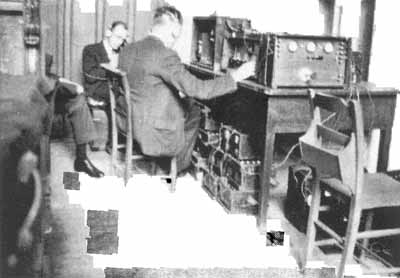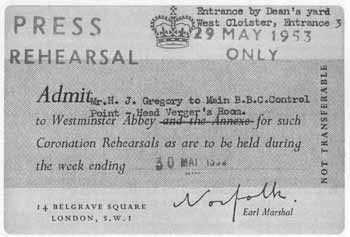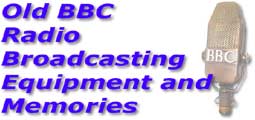When in his early 20s he proposed to mother. She said, 'yes but I won't marry a sailor' so in 1926 he left the Merchant Navy where he had been a radio officer and applied to join the newly formed British Broadcasting Company, (later the Corporation) and was accepted. I think the early BBC engineers learned on the job as there was no one to show them the ropes. Dad quickly moved into the Outside Broadcasts department and all the programmes from outside the studio were in his remit.

Early OB equipment with Horace in the distance.
Dad was immensely practical and I think he had surplus energy and I never remember him sitting down and reading a book. Always on the go. When the outside of the house needed painting, he would do an hour's painting up a ladder, have breakfast, change into his office suit, don his bowler hat, take the train to work, do a day's work and then return and do another two hours painting.
In about 1936 or 1937, Dad moved from Radio to the new exciting medium called Television. Consequently we had a TV. TV sets then were very big; ours was about 1m wide, 1m deep and about 1.5m tall and made of veneered wood. The top half had a radio with small doors opening out to reveal the tuning knobs, and the lower half of this cumbersome piece of furniture was the TV. To use the screen you opened a flap which revealed a screen about 20cm or 8 inches square. The programmes were intermittent on weekdays and on Saturday mornings the two hour programme was always the same. We knew no one else who owned a TV set.
In the summer of 1939 we went on our summer holiday and immediately on our return on Sunday 3rd September Dad was called to 10 Downing Street very urgently for the Prime Minister to broadcast to the nation at 11 o'clock. That was Neville Chamberlain's declaration of war.
At the outbreak of war television transmitting closed down and Dad returned to Radio with Outside Broadcasts. As a BBC engineer he came under a 'reserved occupation', so at 35 he was saved conscription to the armed forces. He spent every evening doing air raid duty with the local ARP or in London with the BBC.
The 1953 coronation was the first to be televised. This meant months of planning for the BBC Outside Broadcasts department and Dad had known that he would be working in Westminster Abbey during the service. The day was to be a national holiday and I had planned to be at home watching on the television. As our present TV set was so old we bought a new one especially for the day as did many people in those parts of the country where there were transmitters. The

Steve continues: In the 1960s my grandparents still had the original TV (that my mother refers to above) as a memento. I was just starting to become interested in electronics myself and found it fascinating to compare it against the more modern one in the same room. We would visit them for Christmas Day but whereas all my friends had Christmas lunch we'd have Christmas dinner when Granddad got home from work. I recall him talking about broadcasting the Boat Race where one year he was in an aircraft following the race when it had an engine problem and had to make an emergency landing. He was also heavily involved in the broadcasts of the 1966 World Cup and for many years I had his BBC pass that gave him access to Wembley Stadium.
Granddad would have retired in about 1969. I recall him showing me a gold watch he'd received from the Director General, whether that was for 40 years service or retirement I don't remember. I was impressed that he'd actually got to meet the DG but I recall him saying in his usual matter of factly way that 'he knew him quite well.'

